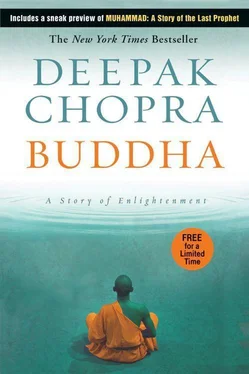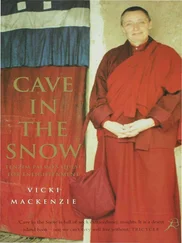Without answering, the man began to apply the goad heavily to the bullock, who lowed mournfully as it struggled to regain its footing. Out of panic it pulled the wrong way and tilted the cart farther over; more bags spilled out, and the woman began to weep loudly. Beside himself now, the man couldn’t decide which one to beat next, the bullock or his wife.
“Wait,” begged Gautama. “I can help you.”
“How?” the husband grumbled. “If I have to give you a bag of rice, you’re cheating me.”
“Don’t think about that, just try to calm down,” Gautama coaxed.
Once he got the husband to back off from his rage, Gautama helped him free the bullock from its yoke and unload the cart. Then he and the man shouldered the cart from the rear and with considerable grunting and groaning rolled it out of the ditch. While they sweated in the hot sun, the wife sat in the shade holding the bullock’s tether and fanning herself with a palm leaf.
“There.” Gautama stood back after the last bag of grain had been put back into place.
Without a word the man got into the driver’s seat. “Are you coming or not?” he said sourly to his wife.
She put her hands on her hips. “Why? So I can go home with a man who beats his bullock into a ditch and is so stupid it takes a monk to show him how to get it out again?”
Gautama could see that the man wanted to hit her again with the goad, but his shame kept him from doing it in front of a holy man. He bit his lip while his wife climbed into the cart, flashing a contemptuous smile at the young monk. The cart began to trundle off. Over his shoulder the man said, “Whatever rice you can pick out of the road is yours. Namaste.”
Gautama turned around to find Ganaka standing a dozen yards away laughing, and he was clearly laughing at him. “How long have you been standing there?” Gautama demanded, feeling the blood rising to his face.
“The whole time,” said the older monk nonchalantly. He was chewing a stem of sour grass he’d plucked from the roadside.
“Is there a stream nearby? I need to wash my face,” Gautama said curtly. There was no point, he thought, in asking why Ganaka hadn’t helped or if he had heard of the monastic vow of service. The older monk led the way to a fresh rivulet in the forest. Gautama poured water from his begging bowl over his head and shoulders while Ganaka watched, squatting on his heels.
“Those people didn’t love you for what you did,” he pointed out.
“I didn’t expect them to,” Gautama replied. The stream was shallow enough that the water he poured over his back felt as warm as bathwater. His tense muscles began to relax.
Ganaka said, “If you didn’t want them to love you, at least you wanted gratitude. You’re just too proud to admit it. And angry that I laughed at you. Imagine, here you are being a saint, and a monk, no less, ridicules you for it.”
Hearing the truth stung, but Gautama was too exhausted to work up heavy resentment. Instead he said, “Was I ridiculous in your eyes?”
“Why would it matter? A saint has to rise above ridicule. Maybe I was trying to teach you that.”
“Are you my teacher now? I thought you hated teachers.” Gautama knew that he had let childish pique creep into his voice, but he didn’t care.
He expected Ganaka to keep on mocking him, but the older monk’s voice grew suddenly serious. “I’m part of the world. If you want a teacher, turn to the world.”
Gautama stepped out of the water, feeling cooler but still sore with the sense of having been badly used. “The world’s wisdom is contained in you? Congratulations.”
“Not all the world’s wisdom, but a piece of it. The piece you need to hear,” said Ganaka calmly.
“And what is that?”
“Are you free enough of anger to listen?” Ganaka asked. He met Gautama’s stare. “I didn’t think so.” He sat under a tree and watched Gautama as indifferently as he had watched the husband and wife in trouble. Gautama could have walked away, but after a moment he felt settled enough to sit down beside the older monk.
“Everything you say is true,” he admitted.
“Only it shouldn’t be. That’s your position, isn’t it? That when you act like a saint, you should be loved, and whoever sees you doing good works should be inspired to join you.”
“All right, yes,” said Gautama reluctantly. “What’s your position? That you can be my teacher by standing around and letting me do all the work?”
“There was no work to do.”
“I think there was,” Gautama protested.
“Then tell me where I’m wrong. The man would have calmed down eventually and figured out how to unyoke his animal and empty the cart. He and his wife were strong enough to push the cart out of the ditch, and if they weren’t, they could walk back to their village and get help. So by helping them, you kept them from helping themselves.”
“Go on.”
“If you thought you were preventing violence because the man stopped beating his wife, all you really did was shame him. He will not only resent you for that; he will beat his wife extra hard tonight to make a point. He is master, she is slave.”
“And no one should try to show them a better way?”
“Maybe, but why should it be you? They had parents and priests who taught them right from wrong. They must know families where the wife isn’t beaten every time the husband loses his temper. Or maybe they don’t. Why should it be up to you? You’re a wandering beggar,” Ganaka pointed out.
Gautama was too tired to argue in the face of the older monk’s certainty. “I’m sorry you feel that way,” he mumbled.
Ganaka laughed with a hint of scorn. “You can do better than that. I can tell what you’re thinking. You’re highborn, so that makes you right. No question about it.”
“Do you always goad people like this?” Gautama asked, resolving not to make himself the butt of this irksome cynic.
“Is there any other way to learn?” Ganaka replied. “If you don’t want the world to have more shame, helplessness, and slavery, stop doing what you did today. All you did was increase it.” He got to his feet, as indifferent as if they’d been talking about the possibility of rain, and looked around for the shortest way back to the main road.
“Thank you for the bread, and the company,” Gautama said, forcing the words out.
Ganaka shrugged. “I may not be enlightened enough to suit you, my idealistic lad. But I’m far from being a fool. Don’t pretend you’re a saint. Experience tells me that they might not even exist.”
THE OLD KING mourned the day he saw his son ride out the gates of Kapilavastu, but he didn’t send guards to break into the Shiva temple and arrest the high Brahmin. The writing had been on the wall a long time before their plan finally failed. Canki realized that fate had turned against him, and he decided to appear in the king’s chambers one morning unannounced. He bowed without prostrating himself on the floor.
“I hope you don’t have the gall to try to console me,” Suddhodana grumbled. He had taken to sleeping late, and more often than not there was a young courtesan on the pillow by his side, the only consolation Suddhodana wanted these days.
“I’m only a priest, bringing the king’s wishes before the gods,” Canki said.
“I had only one wish, and you failed to make it come true. Your presence is distasteful to us. You should stay home.”
They had hatched their conspiracy almost thirty years earlier, and Suddhodana wasn’t one to look backward. He placed little faith in the promise that Siddhartha would return. “Return as what?” he said. “He’ll never come back a king.” The last part he didn’t voice aloud to anyone, just as he didn’t voice a secret intention he had, to name Devadatta as his successor. The notion had come to him in a dream. He often revisited old battles in his dreams, but not as he had fought them. Instead he was a wanderer among the dead.
Читать дальше












